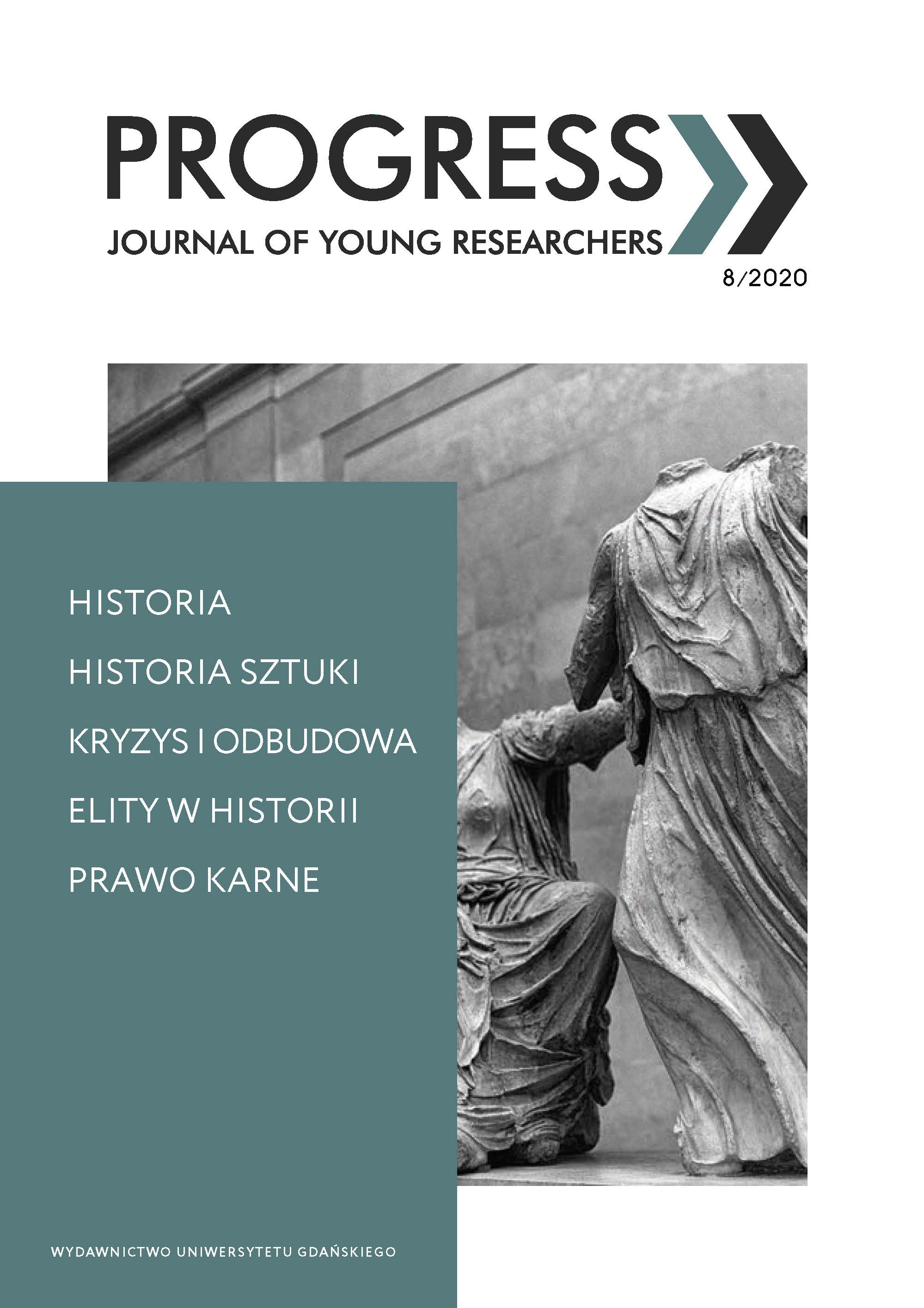On the case of functioning of the administrators of the city at the hospital of The Holy Spirit in Cracow
DOI:
https://doi.org/10.26881/prog.2020.8.03Keywords:
Cracow,, Order of the Holy Ghost, regular canons, medieval hospitalsAbstract
Stanisław Piekarczyk, over half a century ago, carried out research on the issue of city administrators at the hospital of The Holy Spirit in Cracow. By analyzing most of the available source material, mainly created by local urban authorities, he has painted a picture of a role of the representatives of the Cracovian councilors which they had played in the management of the hospital properties. In accordance with the Stalinist historiography, he has placed emphasis on the participacion of the townsfolk in the organization of the social welfare in the medieval Cracow, marginalizing thus role of the Orden of Canons Regular of the Holy Spirit de Saxia. However, looking closer at the issue, we can notice that not all of the Piekarczyk’s theses can be fully defended when confronted with the sources provided by the monastery, especially the modern ones, which present the role of the city in the management of the hospital properties in a different light. Moreover, his focus merely on the Middle Ages, which resulted in disregarding of early modern agreement between the monastery and the council, has led him to partially wrong conclusions.
It is hard to determinate the range of competence of the Cracovian councilors in the management of the hospital of the Holy Spirit, especially since it was under constant evolution since the fire in 1528, at which time the office of the administrators was definitively established in return for the help of the city in the reconstruction of the building complex of the Order of the Holy Spirit. Therefore, two periods of the functioning of the city administrators were specified: from 1324 to 1528 and after 1528. This article focuses on triangular relationship between the city, the hospital and the monastery. In this article an attempt was made to see in what extent the monastery was involved in the management of the hospital, and in what extent the city.
After analyzing the source material, we can say that till 1528 the city council, defined as “caretaker of the sick” in the documents, has been choosing the administrators who were handling estates in the name of the council. However, they were supervising only those properties, which have been directly given to the councilors to manage, while they didn’t have any influence on the management of the hospital. After 1528, the city council definitively took control over the management of the hospital to such a degree that the Order of the Holy Spirit had no influence on the decision-making. At that time there occurred a conflict between the Order and the administrators, who were proven to be guilty of embezzlement of the hospital properties. However, the monks remained in the hospital as the organizers of the spiritual care. They have also supervised ongoing activities in the orphanage located by the hospital.
medieval hospitals
Downloads
References
Źródła:
Archiwum Metropolitalne w Krakowie, Acta Visitationis, Tom 43, Acta visitationum Ilustrissimi et Reverendissimi D. Iacobi Zadzik Episcopi Cracoviensis Ducis Severiensis.
Archiwum Metropolitalne w Krakowie, Acta officialia, t. 6.
Archiwum Narodowe w Krakowie, rkps. sygn. 3400, 3401, 3402.
Bazeusz W., 1570, Epitome Xenodochii m. Alberti Bassaei Scebresinensis […] siue capita qu[a]eda[m] ex Xenodochio seu libro de officio erga hospites, peregrinos, pauperes variasque miserabiles p[er]sonas p[ro]pter reformandu[m] hospitalia edita […], Biblioteka Narodowa w Krakowie, sygn. SD XVI.O.67, https://polona.pl/item/epitome-xenodochii-m-alberti-bassaei scebresinensis-siue-capita-qu-a-eda-m-ex,Njk1MTMwNjk/ [dostęp: 5.11.2019].
Cracovia artificum 1300–1500, 1917, wyd. J. Ptaśnik, „Źródła do historyi sztuki i cywilizacyi w Polsce”, t. 4, Kraków.
Księga dochodów beneficjów diecezji krakowskiej z roku 1529 (tzw. Liber Retaxationum), 1968, wyd. Z. Leszczyńska-Skrętowa, Wrocław-Warszawa-Kraków.
Najstarsze księgi i rachunki miasta Krakowa od r. 1300 do 1400, 1878, red. F. Piekosiński, Kraków.
Najstarszy zbiór przywilejów i wilkierzy miasta Krakowa, 1936, wyd. S. Estreicher, Kraków.
Przywilej innowacyjny [w:] S. Tomkowicz, 1892, Zabytki budownictwa miasta Krakowa, t. 1: Szpital Świętego Ducha, Kraków.
Vetera Monumenta Poloniae et Lithuaniae, 1911, t. 2: 1410–1572, red. A. Theiner, Rzym.
Opracowania:
Antosiewicz K., 1966, Zakon Ducha Świętego de Saxia w Polsce średniowiecznej, „Nasza Przeszłość”, t. 23.
Barycz H., 1935, Basaeus Wojciech [w:] Polski Słownik Biograficzny, t. 1: Abakanowicz – Beynart, Kraków-Wrocław.
Bruździński A., 2004, Biskup krakowski Piotr Tylicki wobec zakonów w swojej diecezji (1607–1616), „Folia Historica Cracoviensia”, t. 10.
Dworzaczek W., 1971, Leliwici Tarnowscy. Z dziejów możnowładztwa małopolskiego wiek XIV–XV, Warszawa.
Fara A., 2008, L’Ordine e la Confraternita del Santo Spirito dalle origini allo sviluppo di una vocazione di frontiera ai confini orientali della Christianitas latina: la Transilvania tra Medioevo e prima Età moderna (XIV–XVI secolo), Piza.
Keyvanian C., 2015, Hospitals and Urbanism in Rome, 1200–1500, Brill.
Noga Z., 2003, Krakowska rada miejska w XVI wieku. Studium o elicie władzy, Kraków.
Niemczyk K., 2009, Kilka uwag do genealogii Elżbiety Pileckiej-Granowskiej i jej rodziny, „Średniowiecze polskie i powszechne”, t. 1.
Piekarczyk S., 1952, Początki miejskiej opieki społecznej w średniowiecznym Krakowie, „Rocznik Krakowski”, t. 32.
Piwowarczyk E., 2010, Legaty testamentowe „ad pias causas” w XV-wiecznym Krakowie. Z badań nad pobożnością miejską, Kraków.
Przybyłowicz O.M., 2015, Rachunki prepozyta klasztoru Św. Ducha de Saxia w Krakowie Macieja Regimontowicza z lat 1570–1591. Świat ludzi i rzeczy, „Roczniki Dziejów Społecznych i Gospodarczych”, t. 75.
Słoń M., 2002, Fundacje szpitalne władz komunalnych jako centra kultu miejskiego [w:] Ecclesia et civitas. Kościół i życie religijne w mieście średniowiecznym, red. H. Manikowska, H. Zaremska, Warszawa.
Starzyński M., 2010, Krakowska rada miejska w średniowieczu, Kraków.
Wdowiszewski Z., 2005, Genealogia Jagiellonów i Domu Wazów w Polsce, Kraków.
Wyrozumski J., 1998, Kraków do schyłku wieków średnich [w:] Dzieje Krakowa, red. J. Bieniarzówna, J. Małecki, t. 1, Kraków.
Wysmułek J., 2015, Testamenty mieszczan krakowskich (XIV–XV wiek), Warszawa.
Downloads
Published
How to Cite
Issue
Section
License
Copyright (c) 2020 Author(s)

This work is licensed under a Creative Commons Attribution 4.0 International License.

 Academic Scientific Journals
Academic Scientific Journals




